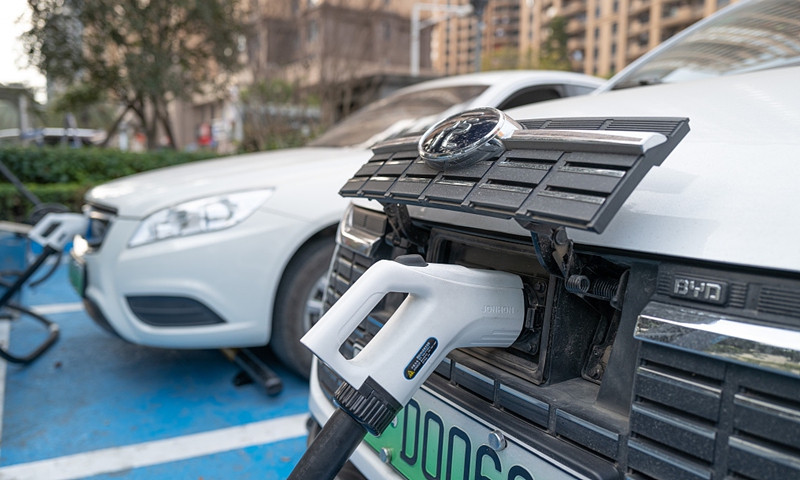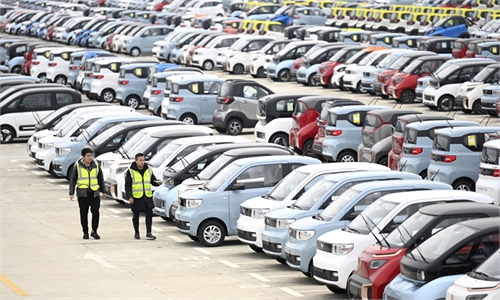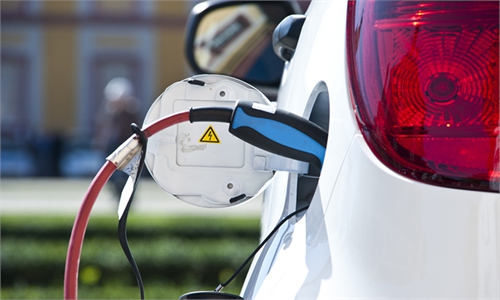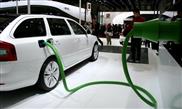
NEV Photo:VCG
Rising upper stream component prices may dent China's new-energy vehicle spending binge, a senior industry expert warned on Wednesday, as more company executives complain about rising prices for semiconductors.Business for upper stream industries in the new-energy vehicle (NEV) industrial chain may stand a winner to reap benefit of a wave of subsidies doled out by local governments in many parts of China in an effort to shore up consumption, as the prices for chips and lithium rise,.
Shen Hui, CEO of NEV maker Weltmeister, wrote on his Sina Weibo on Tuesday that the rumored price hikes by suppliers including Bosch and other tier 1 brands are true and the cost on chips have surpassed that of power battery, traditionally the most expensive component of an electric car.
Shen's comments follow other executives of leading Chinese NEV brands on the chip woes.
He Xiaopeng, CEO of electric-vehicle firm Xpeng said in mid April on his Weibo account that the price of chips was widely speculated and that his supply chain team is also urgently looking for chips supplies. A NEV needs over 5,000 chips, He said.
Power battery typically accounts for 30-40 percent of total cost of a NEV.
Cui Dongshu, secretary-general of the China Passenger Car Association (CPCA), told the Global Times on Wednesday that while the chip woes faced by different electric car makers lead to different levels of pain, due to varying levels of inventory and procurement strategy adopted by companies.
Cui said the conclusion of chips outweighs power battery by Weltmeister may showcased a particular procurement woe for the company but he noted that the new wave of prices in chips, as well as lithium, will translate into a price hike in final NEV cars and will dent emerging purchasing enthusiasm in the country.
A growing list of Chinese cities are doling out purchase subsidies to NEV buyers, as the government tries to give the market a jolt after overall auto sales in April fell to half the level of March, amid a round of epidemic flare-ups that hit major cities including Shanghai and Beijing.
The country is also promoting NEV sales in the rural areas while in places like Shanghai and Shenzhen, NEV buyers will be subsidized for 10,000 yuan ($1,498) per car.
However, with the price hikes, experts said suppliers of upper stream materials stand to be the beneficiaries of the windfall.
Pushed up by rising costs for raw materials and components, pure electric cars in the domestic market saw their prices hiking since March. Forty models from 15 brands including Tesla, BYD and Nio have seen price hikes, with many models saw prices rising by 10,000 yuan, the Economic Observer reported in mid April.
Per CPCA data, China's retail sales of passenger cars reached 1.04 million units in April, down 35.5 percent year-on-year. Despite a macroeconomic downturn and outbreaks of COVID-19, sales of some NEVs retained strong momentum.
Chinese NEV maker BYD in its fiscal report released in end April posted a 240.59 percent year-on-year increase in net profits for the first quarter. BYD is reportedly seeking acquisitions of a total of six lithium mines in Africa with mineral reserves enough to supply its production at 1.5 million units a year for up to 10 years.
German supplier of chemicals and materials used in making semiconductors, Merck KGaA, said on Tuesday it inked a deal on a semiconductor base in Zhangjiagang, East China's Jiangsu Province in its largest single electronics business investment in China.




